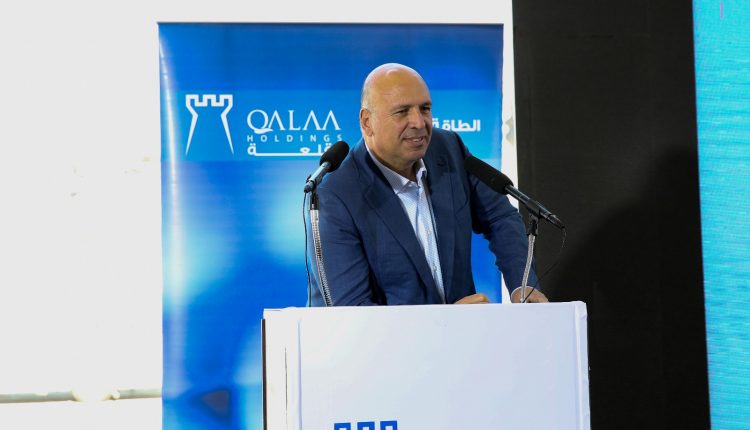Egypt’s Qalaa Holdings, a leader in energy and infrastructure, has recorded a 191 percent year-on-year increase in first-quarter revenues to 10.4 billion Egyptian pounds ($650.1 million), according to its consolidated financial results released on Wednesday.
The growth is primarily driven by booked sales revenue from Qalaa’s ERC on its first full income statement post its recognition as an operational asset in the firs quarter, as well as solid performances from TAQA Arabia and Nile Logistics
ERC is operating at 100 percent capacity and began booking sales revenue and a full income statement as of January 2020; Continuous strengthening of COVID-19-related health, safety and business continuity measures sees Qalaa well positioned to navigate upcoming period of uncertainty
Qalaa’s top line performance in first quarter was primarily driven by the 6.8 billion pounds booked by ERC on its first full income statement post its recognition as an operational asset at the beginning of January 2020. ERC’s revenues made up 66 percent of Qalaa’s consolidated top line for the quarter. Growth at the consolidated level was further supported by an 18 percent year-on-year top line expansion at TAQA Arabia on the back of solid performance across its gas, marketing, and power divisions and with a growing contribution from TAQA Solar. Moreover, Nile Logistics also delivered strong results, witnessing a year-on-year revenue increase of 81 percent in first quarter on the back of capacity expansions at the coal/pet coke storage facilities, commencement of the grain warehouse, and increased efficiencies at the inland container depot.
“The first quarter of 2020 marked a milestone for Qalaa with the booking of revenues by the Egyptian Refining Company (ERC), a development that has been years in the making,” said Qalaa Holdings Chairman and Founder Ahmed Heikal. “I am pleased to report that in its maiden quarter ERC has been operating at 100 percent capacity utilization with all processes running smoothly. Meanwhile, Qalaa’s growth was also supported by continued strong performance at TAQA Arabia and Nile Logistics, both of which are delivering growth and proving resilient in the face of COVID-19. Moreover, at National Printing, the company achieved healthy growth in first-quarter EBITDA, with its performance set to continue particularly with El Baddar’s new plant coming online during the second half of 2020.”
While the recent volatility in the oil market and the narrowing in heavy fuel oil (HFO) to diesel spreads have adversely impacted the refinery’s profitability, ERC recorded an EBITDA of 442.2 million pounds in first quarter. ERC’s EBITDA contribution pushed Qalaa’s consolidated EBITDA in first quarter to 773.2 million pounds, registering a strong year-on-year increase of 105 percent. Consolidated EBITDA growth also came on the back of strong performances at all of TAQA Arabia’s divisions as well as operational improvements at Nile Logistics and National Printing. Excluding ERC, Qalaa’s EBITDA would have declined 12 percent year-on-year to 331.0 million pounds in first quarter on the back of ASEC Holding’s subsidiaries that were impacted by an underperforming cement market in Egypt as well as rising energy costs and a 35-day strike at Al Takamol Cement in Sudan that ended in March 2020. Additionally, ACCM’s exports (an ASCOM subsidiary) were negatively impacted by diminished international trade as a result of COVID-19.
Qalaa Holdings recorded a net loss after minority interest of 405.1 million pounds in first quarter compared to a net loss of 154.6 million pounds in the same period last year. The decline was driven by ERC’s loss before minority interest of 1.4 billion pounds in first quarter due to the pressure on HFO and diesel spreads and an overall soft oil market as previously mentioned.
“Despite the nationwide curfew and general disruption in economic activity that has resulted from COVID-19, we remain hopeful, as most of our companies continued to post year-on-year growth. At this time, we are prioritizing the health and well-being of our more than 17,000 employees across our subsidiaries and we have decided to maintain our full work force with no layoffs at this time,” said Heikal.
“The serious challenges caused by COVID-19 cannot be underestimated, however, we are taking the necessary measures to navigate them, just as we have managed to weather previous crises. As a new normal sets in, we expect to see accelerated growth trends across our portfolio,” said Hisham El-Khazindar, Qalaa Holdings Co-Founder and Managing Director.

“At ERC, while the past few months witnessed a dislocation of global oil and petroleum products markets, including severe pressure on diesel prices, and while we see this situation persisting and potentially deteriorating in the second quarter and beyond, we remain confident in ERC’s long-term fundamentals and its ability to deliver significant incremental value to Qalaa’s bottom-line in due time. In the meantime, we have set in motion a debt relief program with our lenders that will see ERC’s obligations temporarily deferred to December 2020, at which point we are hopeful that market conditions will have normalized.” El-Khazindar explained.
“We also continued to make headway on our debt restructuring initiatives, which should result in debt reduction at a number of platforms, namely ASEC Holding, Nile Logistics and GlassRock. Qalaa is also exploring avenues to benefit from the Egyptian government’s stimulus plan and relief measures in response to the COVID-19 pandemic, including energy price cuts, interest rate cuts and a six-month deferral on debt payments. These relief measures will further support Qalaa Holdings’ liquidity position.” El-Khazindar added.
“As we navigate forward, we continue to adopt strengthened health and safety measures across our organization, including stringent hygiene and disinfection protocols, limiting the number of in-office and on-site employees to adhere to social distancing guidelines, and strengthening our IT infrastructure to support higher levels of work-from-home policies until such time it is deemed safe to return to our offices at full capacity. We remain confident in our ability to weather the challenges and ensure business continuity, and we look forward to remerging as a stronger and leaner organization once the COVID-19 crisis resolves,” concluded El-Khazindar.


